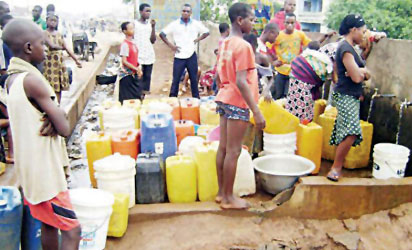The Bread of Life Development Foundation (BLDF) has called for the review of Nigeria’s National Water and Sanitation Policy to align it with the newly adopted Sustainable Development Goals (SDGs), which seeks to achieve universal coverage for safe water supply and sanitation by the year 2030.

“The present Water Supply and Sanitation Policy was approved in the year 2000 in the context of the Millennium Developmental Goals (MDGs) which ended last year. Now is the time to start the march towards achieving the newly adopted SDGs, particularly Target 6 on safe drinking water supply and sanitation.
“This necessitates a review of existing strategies that has not worked; and the formulation and development of new policy instruments, guidelines, strategies, funding mechanism, and allocation of sectoral rules and responsibilities to turn the dream of universal coverage of safe WASH by 2030, into a reality,” said the BLDF in a statement signed by its Programme Officer, Taiwo Owolabi.
According to him, the 36 state governments across the federation also need to review and update their water supply and sanitation policies in this light, particularly since urban and rural water supply and sanitation is statutorily a state and local government responsibility.
He described as unfortunate the fact that Nigeria, despite its enormous financial resources, was not able to achieve the MDG and its target for water supply and sanitation, even as he called for trebling of efforts to achieve the SDG for water supply and sanitation, “which is a much more ambitious target because it calls for universal coverage of safe drinking water and sanitation by the year 2030”.
His words: “Now is the time for federal and state governments in Nigeria to start making ambitious plans and allocating adequate public funds to achieve the SDG goal for water supply and sanitation; while new policy declarations, strategy documents, and implementation guidelines developed in this regard must be backed by firm political commitment and action.
“We have another 15 years to give our people access to safe drinking water, and it is our belief that 15 years is enough to eradicate open defecation in Nigeria; 15 years is enough to stop the incidence of preventable infant and maternal diseases such as cholera, dysentery, typhoid in Nigeria; and 15 years is enough to ensure every Nigerian citizen has access to safe drinking water supply and sanitation services.
“Now is the time to update national and state policy instruments, sector strategies and implementation guidelines and ensure adequate public financing backed with strong political will in order to achieve the SDG 6 for water supply and sanitation.”
